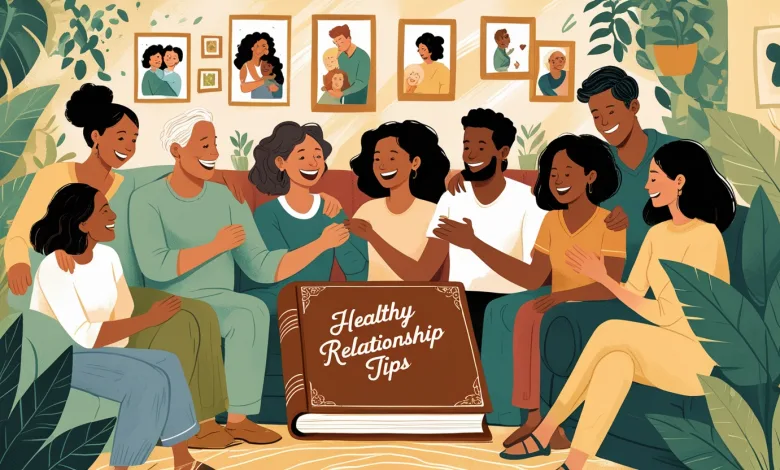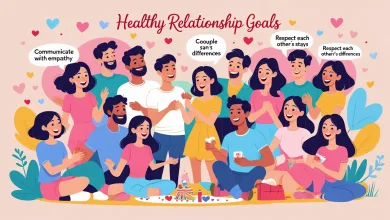Healthy Relationship Tips: How to Build and Maintain Lasting Connections

The Foundation of Thriving Relationships
Let’s face it — relationships aren’t always a walk in the park. They require genuine effort, understanding, and a whole lot of patience! Whether you’re just starting out with someone new or you’ve been together for decades, cultivating a healthy relationship remains an ongoing journey rather than a destination. The good news? Research consistently shows that healthy relationships contribute significantly to our overall wellbeing, happiness, and even longevity.
In this comprehensive guide to healthy relationship tips, we’ll explore practical strategies backed by relationship experts and psychological research that can help you and your partner build a stronger, more resilient bond. From communication techniques to conflict resolution, emotional intimacy to maintaining individuality — we’ve got you covered with actionable advice that you can implement starting today. Ready to transform your relationship? Let’s dive in!
Understanding the Pillars of Healthy Relationships
Before jumping into specific tips, it’s important to understand what actually constitutes a healthy relationship. While every partnership is unique, research has identified several fundamental pillars that support lasting, fulfilling connections.
At the heart of every thriving relationship is mutual respect. This means valuing each other’s opinions, boundaries, and individuality, even when you disagree. According to Dr. John Gottman, renowned relationship researcher, respect is the foundation upon which all other aspects of a successful relationship are built. “Without respect, the relationship is doomed,” he explains in his book “The Seven Principles for Making Marriage Work”. Alongside respect, trust forms another critical pillar — the belief that your partner has your best interests at heart and will remain reliable, honest, and faithful.
Other essential elements include effective communication, emotional intimacy, shared values and goals, and maintaining a healthy balance between togetherness and individuality. These pillars don’t emerge overnight but develop gradually through consistent effort and commitment from both partners.
Communication: The Lifeline of Every Relationship
If there’s one healthy relationship tip that experts universally emphasize, it’s this: learn to communicate effectively. Communication serves as the oxygen that keeps relationships alive and thriving.
“Most relationship problems can be traced back to misunderstandings and poor communication,” notes Dr. Sue Johnson, developer of Emotionally Focused Therapy and author of “Hold Me Tight”. When communication breaks down, assumptions fill the void, often leading to unnecessary conflicts and emotional distance.
Active Listening: The Art of Being Present
Communication isn’t just about talking — it’s equally about listening. Active listening involves:
- Giving your full attention (put that phone down!)
- Making eye contact and using affirming body language
- Avoiding interrupting or planning your response while the other person speaks
- Reflecting back what you’ve heard to ensure understanding
Research from the University of Michigan found that couples who practice active listening report significantly higher relationship satisfaction compared to those who don’t. It’s not just about hearing words; it’s about understanding the emotions and needs behind them.
Vulnerability: Strength in Openness
Being vulnerable might seem scary, but it’s the secret sauce of deep connection. Brené Brown, whose TED talk on vulnerability has been viewed millions of times, explains that “vulnerability is the birthplace of love, belonging, joy, courage, empathy, and creativity”.
When you share your true thoughts, feelings, and needs with your partner, you create opportunities for genuine intimacy. This doesn’t mean dumping every thought without filter, but rather thoughtfully sharing your inner world in a way that builds connection rather than creates distance.
Navigating Conflict: Turning Challenges into Growth Opportunities
Let’s bust a myth right away: conflict isn’t inherently bad for relationships. In fact, research shows that how couples handle disagreements is far more important than whether they disagree in the first place. Healthy conflict can actually strengthen your relationship when approached constructively.
The key difference between couples who thrive and those who struggle isn’t the absence of conflict but how they navigate it. According to research by Dr. Gottman, couples who maintain stable, satisfying relationships manage their disagreements with respect, humor, affection, and a willingness to compromise.
Conflict Resolution Strategies That Actually Work
When tensions rise, these healthy relationship tips for conflict resolution can make all the difference:
- Choose the right time and place — avoid sensitive discussions when either of you is hungry, tired, or distracted
- Use “I” statements rather than accusatory “you” statements (e.g., “I feel worried when…” instead of “You always…”)
- Stick to one issue at a time rather than bringing up past grievances
- Take breaks when emotions run high, but commit to returning to the conversation
- Focus on understanding your partner’s perspective rather than “winning” the argument
“The goal of conflict resolution isn’t to determine who’s right or wrong, but to reach a mutual understanding and find solutions that work for both partners,” explains relationship counselor Esther Perel.
Building and Maintaining Trust: The Relationship Cornerstone
Trust isn’t just given — it’s earned through consistent actions over time. And while it takes ages to build, it can be damaged in an instant. That’s why maintaining trust requires ongoing attention and care.
“Trust is built in very small moments,” explains Dr. Gottman, who refers to these as “sliding door moments” — seemingly insignificant opportunities to choose connection over disconnection. When your partner shares something important, how do you respond? Do you turn toward them with interest, or away with indifference?
Rebuilding Trust After Breaches
Even in the healthiest relationships, trust can sometimes be damaged. When this happens, rebuilding requires:
- Genuine acknowledgment of the breach and its impact
- Sincere apology without defensiveness or excuses
- Changed behavior that demonstrates commitment to doing better
- Patience from both partners, recognizing that healing takes time
Research shows that relationships can actually emerge stronger after successfully navigating trust breaches, but only when both partners are committed to the repair process.
Emotional Intimacy: The Heart of Connection
Physical connection might initially draw people together, but emotional intimacy is what keeps them there. Emotional intimacy involves sharing your inner world with your partner and creating a safe space for them to do the same.
Psychologist Dr. Arthur Aron developed a set of 36 questions that can help build emotional closeness between partners. These questions progressively deepen from relatively surface-level to highly personal, facilitating vulnerability and connection. While these questions gained popularity as a way to “fall in love with anyone,” their real value lies in nurturing ongoing emotional intimacy in established relationships.
Creating Emotional Safety
For emotional intimacy to flourish, both partners need to feel emotionally safe. This means:
- Responding to vulnerability with empathy rather than judgment
- Validating feelings even when you don’t fully understand them
- Being reliable in both words and actions
- Respecting boundaries without taking them personally
“Emotional safety is the prerequisite for vulnerability, which in turn is the gateway to intimacy,” explains psychologist Dr. Sue Johnson.
Maintaining Individuality: Together But Separate
One of the most overlooked healthy relationship tips involves balancing togetherness with individuality. The strongest relationships aren’t those where partners become one merged entity, but those where two whole individuals choose to build a life together while maintaining their separate identities.
Psychologists call this “differentiation” — the ability to maintain your sense of self while being emotionally connected to your partner. Research consistently shows that couples with healthy differentiation report higher relationship satisfaction and lower conflict.
Nurturing Individual Growth
Supporting each other’s personal growth strengthens your relationship in multiple ways:
- It prevents codependency and resentment
- It brings fresh energy and experiences into the relationship
- It builds mutual respect and admiration
- It creates space for healthy longing and appreciation
“The point of a relationship isn’t to have another who might complete you, but to have another with whom you might share your completeness,” writes Neale Donald Walsch. This perspective shifts the relationship from a needs-based arrangement to a growth-oriented partnership.
The Power of Appreciation: Cultivating Gratitude
In long-term relationships, it’s dangerously easy to take your partner for granted. The antidote? Deliberate appreciation. Research shows that couples who regularly express gratitude for each other report significantly higher relationship satisfaction.
This healthy relationship tip is remarkably simple yet powerful: make appreciation a daily habit. Notice the big and small things your partner does, and express genuine thanks. According to Dr. Gottman’s research, thriving relationships maintain a “magic ratio” of at least five positive interactions for every negative one.
Beyond “Thank You”: Creative Ways to Show Appreciation
- Leave unexpected notes of appreciation
- Publicly acknowledge your partner’s contributions or achievements
- Remember and honor the things that matter to them
- Verbalize specific qualities you admire about them
- Make time for meaningful “thank you” conversations
Navigating Life Transitions Together
From career changes to having children, relocating to caring for aging parents, relationships face numerous transitions that test their resilience. How couples navigate these changes often determines whether the relationship thrives or struggles.
Research from the Gottman Institute shows that 69% of relationship conflicts are perpetual problems that never fully resolve, often stemming from fundamental differences in personality or lifestyle preferences. The key isn’t solving these unsolvable problems but finding ways to dialogue about them with respect and even humor.
Creating Shared Meaning Through Challenges
Relationship expert Dr. Viktor Frankl suggests that finding meaning in challenges helps couples not just survive difficulties but grow through them. When you approach transitions as a team with a shared sense of purpose, you can transform potential relationship stressors into opportunities for deeper connection.
Common FAQs About Healthy Relationships
How do I know if my relationship is healthy?
A healthy relationship generally feels supportive, respectful, and balanced. Key indicators include feeling safe to be yourself, mutual trust and respect, effective communication, healthy boundaries, and a sense that both partners contribute to the relationship. If you consistently feel anxious, drained, or diminished in your relationship, these may be warning signs of unhealthy dynamics that deserve attention.
Can a relationship recover from serious problems like infidelity?
Yes, relationships can recover from serious breaches of trust, including infidelity, but the process requires genuine commitment from both partners. Research by relationship therapist Dr. Shirley Glass indicates that approximately 70% of couples who seek therapy after infidelity are able to rebuild their relationships. The recovery process typically involves transparency from the partner who broke trust, empathy for the hurt partner’s pain, professional support, and patience as new patterns of trust slowly develop.
How important is physical intimacy in a healthy relationship?
Physical intimacy is one component of a healthy relationship, but its importance varies widely between couples. Research shows that what matters most isn’t frequency but whether both partners feel satisfied with their level of physical connection. Open communication about needs and preferences is essential, as mismatched expectations around physical intimacy can create significant relationship strain if not addressed compassionately.
What’s the most common reason relationships fail?
While every relationship is unique, research consistently points to communication problems as the most frequent contributor to relationship breakdown. A study by the American Psychological Association found that 43% of couples who sought therapy cited communication problems as their primary concern. Other common factors include trust issues, financial disagreements, growing apart over time, and unresolved conflict patterns.
How do we keep our relationship strong while raising children?
Parenting inevitably changes relationship dynamics, often reducing couple time and increasing stress. Research shows that relationship satisfaction typically declines after having children but can be protected by:
- Scheduling regular couple time without children
- Maintaining open communication about parenting approaches
- Supporting each other’s parenting efforts rather than criticizing
- Finding ways to connect in small moments throughout busy days
- Approaching parenting as a team rather than competitors
Wrapping It All Up: Your Journey to a Healthier Relationship
Building and maintaining a healthy relationship isn’t about achieving perfection — it’s about creating a partnership where both people feel valued, supported, and inspired to grow together. The healthy relationship tips we’ve explored offer a roadmap, but every couple must find their unique path forward.
Remember that relationships evolve through seasons, each bringing different joys and challenges. What remains constant is the need for mutual respect, effective communication, emotional safety, and a willingness to choose each other again and again through life’s inevitable changes.
As relationship expert Esther Perel wisely notes, “The quality of our relationships determines the quality of our lives.” By investing in the health of your relationship using the strategies we’ve discussed, you’re not just building a stronger partnership — you’re creating the foundation for a more fulfilling life overall.
The most important thing to remember? Small, consistent actions matter more than grand gestures. Start implementing these healthy relationship tips one step at a time, celebrate progress rather than expecting perfection, and approach the journey with curiosity and compassion — both for your partner and yourself.






